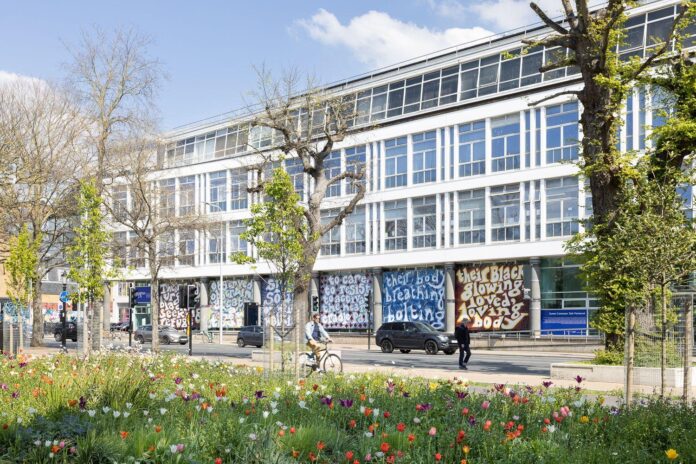The University of Brighton has announced it is closing the Brighton Centre for Contemporary Art (BCCA), saying it is facing “very significant challenges” in terms of income and expenditure including “the near decade-long freeze in undergraduate tuition fees” as well as “generationally high levels of inflation and soaring energy costs”.
The gallery, which opened in 2019, is one of the only to focus on visual art in the south coast city. Exhibitions over the past five years have included those by Bill Lynch and Billie Zangewa—their first in a UK institution, as well as major outdoor commissions by Jade Montserrat and Alexandre da Cunha, and exhibitions by Amalia Pica, Resolve Collective and Lloyd Corporation, among others.
In an email sent to stakeholders this week, Professor Tamar Jeffers McDonald, the Dean of the School of Art and Media at the university, acknowledges the BCCA “has made positive links with local communities and practitioners, and brought the work of international artists to the city”. However, Jeffers continues: “Given the competing demands on our resources, we now need to focus on our core business of providing the best educational experience we can for all our students, whilst continuing to meet our regional priorities and ambition through research and innovation.”
A university spokeswoman echoed the Dean’s reasons, citing “financial challenges which mean that we are having to reduce expenditure”.
Ben Roberts, the director of the BCCA, says the decision to close has “come out of the blue”. The gallery was subject to an internal review a year ago, which Roberts says was “very positive”. A spokeswoman for the university says the review “explored the future of the BCCA and the need to grow income to ensure financial sustainability”. She adds: “However the unprecedented inflationary pressures has meant that the university is no longer able to invest in the gallery.”
Earlier this month the university began a consultation period with staff across all departments; 400 people have been told their jobs might be at risk as the university seeks to save £17.9m. More than 100 staff are expected to lose their jobs when the consultation ends on 20 June.
According to a report in the Times Higher Education supplement, members of the local branch of the University and College Union said they felt cuts could have been avoided with better financial management, pointing to an expensive campus redevelopment that involved £17m being spent on acquiring the site of a former gym.
Roberts says the whole process has felt “very top down”. He adds: “They are calling it a consultation, but it doesn’t feel like one. There was no discussion about what we might do to reduce costs or try to be part of a solution.” Reductions in Arts Council funding “have made some difference”, Roberts says. “There is less and less money for artists just to make work or for galleries to put on shows.”
Turner Prize-winner Helen Cammock, who studied in Brighton 30 years ago and splits her time between the south coast and London, had been commissioned to create 30 pieces for the façade of the BCCA, due to go on show this summer. That project has now been pulled, though there are tentative plans for it to be shown elsewhere on the south coast.
Other exhibitions in the pipeline which have now been cancelled include one by Tamara Henderson, which was a joint commission with the Camden Arts Centre, and the first major showing of early film and performance work made at Brighton University by Helen Chadwick.
“My commission was an ode to Brighton,” Cammock says. “It’s frustrating for me as an artist but the wider picture is far more troubling. This government is decimating the arts, it’s stretching it to the limits. The whole brain drain is really unhealthy. It’s not just unhealthy for the context, it’s unhealthy for society. We need artists and we need art.”
Cammock, who used to run Brighton Photo Fringe, says there have been “lots of mistakes about the contemporary art context” in terms of funding for visual art in Brighton over the years. “Shutting BCCA is a really big mistake,” she adds.
The artist notes how lots of grassroots projects manage to pop up in Brighton with very little or no money—“that’s the essence of what Brighton has always been”, she says. “There’s lots of street performance, lots of open air stuff and lots of music venues. And I think contemporary art has been forgotten.”

























